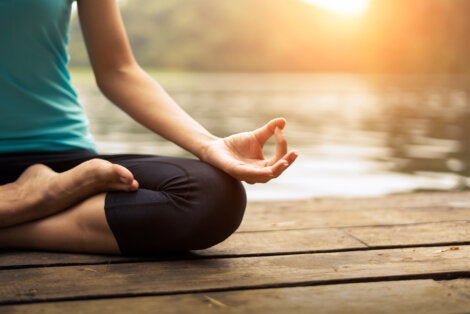When to Trust Your Intuition

The hustle and bustle of everyday life can make it hard for you to tune into your inner spiritual guide. When you plan what you want to do for the day and put yourself on that path, it’s difficult to listen to what your intuition might be telling you. Neglecting it is a big mistake, however, because it can help you live your best life. In today’s article, we’ll share some strategies for learning to trust your intuition.
Plato believed that intuition was the highest function of intelligence. He argued that it was a way of gaining knowledge that you couldn’t get from observation, experience, inference, or reason. But what exactly is it and how do you know when to trust your intuition? Webster’s Dictionary defines intuition as “The power or faculty of attaining to direct knowledge or cognition without evident rational thought and inference”.
The best way to work on your intuition might be to ask yourself a couple of questions. Am I happy? Am I satisfied? These are two questions that your intuition can help you delve deeper into. This way, you can make the necessary changes and respond with a sincere and honest “Yes!” to both of them.
The first psychological study about intuition is credited to Swiss psychiatrist Carl Jung, who argued that intuition was a dimension of personality. He argued that people who are in tune with their intuition are more likely to let their own thoughts dominate their experience. That’s in contrast to a more “bottom to top” approach to life, in which data drives decisions. People who rely on their intuition let their own thoughts and feelings take the reins.
“A woman knows by intuition, or instinct, what’s best for herself.”
-Marilyn Monroe-

Where in the brain does intuition live?
A study conducted by a team of experts at the University of Iowa found that the “axis of intuition” in the brain is the prefrontal cortex. The technical term for that area is called the vmPFC (ventromedial prefrontal cortex).
In the X-Men comics and movies, for example, how does Professor X call on his psychic powers? He puts his fingers on his temples and closes his eyes. Then, from the center of his forehead, waves of energy shine in all directions. The axis of intuition is right there, in the middle of the forehead.
The study mentions that the key to success is to be highly intelligent. However, this isn’t always true. There are people with very high IQs who have trouble making decisions, perhaps because there’s some issue with their intuition.
Dismissing intuition as useless, especially when the quantity of information is so big that it’s impossible to process it in an analytic and conscious way, is giving up the best tool you have in those situations. Without your intuition, you’re more gullible and vulnerable to marketing. As if that weren’t enough, the study also found that, without intuition, it’s harder to learn from your mistakes.
“Never apologize for trusting your intuition. Your brain can play tricks, your heart can be blind, but your gut is always right.”
-Anonymous-
Meditation is the best way to tune in to your intuition
Learning to trust your intuition, as with any habit, takes practice, commitment, and dedication. But never fear, as the process is easier than you think. It’s also very gratifying because intuition is a kind of emotional conjecture or premonition that you can sharpen with a few simple techniques.
Allan Wallace is a Tibetan Buddhist and author of the book Embracing Mind: The Common Ground of Science and Spirituality. He argues that you can develop your intuition with meditation. This fundamental technique helps you concentrate and calm your mind, while you eliminate the residual thoughts that get in the way of your intuition.

What role does meditation play?
Meditation is nothing more than a way to train the mind. It can provide greater emotional freedom by connecting you with your surroundings and opening you up to your own experience. This age-old technique can help you relax and reach a state of mental clarity. The more you practice reaching that state, the better you’ll be at making good decisions.
A neuropsychologist at Wake Forest University concluded that the participants in the study were able to increase their brain activity through meditation. Technically speaking, they improved the interconnectivity in the prefrontal cortex. That’s the area of the brain responsible for behavioral control and decision-making. What does that mean for those of us who’d like to work on making good decisions?
These results showed how meditation directly links you to your ultra-powerful but elusive sense of inner knowledge. It can help you live a life with better financial options, good relationships, and a great job, among others. It can even be good for your health! If those who meditate tend to be successful in their endeavors, you can too.
“Intuition is a very powerful thing, more powerful than intellect, in my opinion.”
-Steve Jobs-
The hustle and bustle of everyday life can make it hard for you to tune into your inner spiritual guide. When you plan what you want to do for the day and put yourself on that path, it’s difficult to listen to what your intuition might be telling you. Neglecting it is a big mistake, however, because it can help you live your best life. In today’s article, we’ll share some strategies for learning to trust your intuition.
Plato believed that intuition was the highest function of intelligence. He argued that it was a way of gaining knowledge that you couldn’t get from observation, experience, inference, or reason. But what exactly is it and how do you know when to trust your intuition? Webster’s Dictionary defines intuition as “The power or faculty of attaining to direct knowledge or cognition without evident rational thought and inference”.
The best way to work on your intuition might be to ask yourself a couple of questions. Am I happy? Am I satisfied? These are two questions that your intuition can help you delve deeper into. This way, you can make the necessary changes and respond with a sincere and honest “Yes!” to both of them.
The first psychological study about intuition is credited to Swiss psychiatrist Carl Jung, who argued that intuition was a dimension of personality. He argued that people who are in tune with their intuition are more likely to let their own thoughts dominate their experience. That’s in contrast to a more “bottom to top” approach to life, in which data drives decisions. People who rely on their intuition let their own thoughts and feelings take the reins.
“A woman knows by intuition, or instinct, what’s best for herself.”
-Marilyn Monroe-

Where in the brain does intuition live?
A study conducted by a team of experts at the University of Iowa found that the “axis of intuition” in the brain is the prefrontal cortex. The technical term for that area is called the vmPFC (ventromedial prefrontal cortex).
In the X-Men comics and movies, for example, how does Professor X call on his psychic powers? He puts his fingers on his temples and closes his eyes. Then, from the center of his forehead, waves of energy shine in all directions. The axis of intuition is right there, in the middle of the forehead.
The study mentions that the key to success is to be highly intelligent. However, this isn’t always true. There are people with very high IQs who have trouble making decisions, perhaps because there’s some issue with their intuition.
Dismissing intuition as useless, especially when the quantity of information is so big that it’s impossible to process it in an analytic and conscious way, is giving up the best tool you have in those situations. Without your intuition, you’re more gullible and vulnerable to marketing. As if that weren’t enough, the study also found that, without intuition, it’s harder to learn from your mistakes.
“Never apologize for trusting your intuition. Your brain can play tricks, your heart can be blind, but your gut is always right.”
-Anonymous-
Meditation is the best way to tune in to your intuition
Learning to trust your intuition, as with any habit, takes practice, commitment, and dedication. But never fear, as the process is easier than you think. It’s also very gratifying because intuition is a kind of emotional conjecture or premonition that you can sharpen with a few simple techniques.
Allan Wallace is a Tibetan Buddhist and author of the book Embracing Mind: The Common Ground of Science and Spirituality. He argues that you can develop your intuition with meditation. This fundamental technique helps you concentrate and calm your mind, while you eliminate the residual thoughts that get in the way of your intuition.

What role does meditation play?
Meditation is nothing more than a way to train the mind. It can provide greater emotional freedom by connecting you with your surroundings and opening you up to your own experience. This age-old technique can help you relax and reach a state of mental clarity. The more you practice reaching that state, the better you’ll be at making good decisions.
A neuropsychologist at Wake Forest University concluded that the participants in the study were able to increase their brain activity through meditation. Technically speaking, they improved the interconnectivity in the prefrontal cortex. That’s the area of the brain responsible for behavioral control and decision-making. What does that mean for those of us who’d like to work on making good decisions?
These results showed how meditation directly links you to your ultra-powerful but elusive sense of inner knowledge. It can help you live a life with better financial options, good relationships, and a great job, among others. It can even be good for your health! If those who meditate tend to be successful in their endeavors, you can too.
“Intuition is a very powerful thing, more powerful than intellect, in my opinion.”
-Steve Jobs-
All cited sources were thoroughly reviewed by our team to ensure their quality, reliability, currency, and validity. The bibliography of this article was considered reliable and of academic or scientific accuracy.
Pilard N. C. G. Jung and intuition: from the mindscape of the paranormal to the heart of psychology. J Anal Psychol. 2018 Feb;63(1):65-84. doi: 10.1111/1468-5922.12380. PMID: 29314029.
International Journal of Clinical and Health Psychology: Prediction of breast cancer screening behavior among older women of Mexican descent: Applicability of theoretical models.
This text is provided for informational purposes only and does not replace consultation with a professional. If in doubt, consult your specialist.







